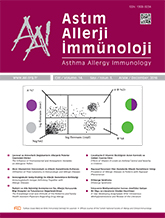


Flow cytometry is a device that analyzes the physical and/or chemical characteristics of cells or particles as they pass through a fluid system one by one. Laser beam diffracted and florescent light emitted by each cell or particle while passing through the fluid system are gathered by optic filters and mirrors, separated into varying wavelengths, and transformed into analogue signals. The signals are digitalized and transferred to a screen as histograms. The histograms are based on the principle of demonstrating the frequency distributions of the parameters measured visually. While the data obtained can be demonstrated in different graphics, the cells are separated according to cell size and granular structure. Analysis of cell groups through fluorescently labeled antibodies enabling analysis of more than one surface antigen at the same time can also be performed by flow cytometry. Today, immunologic diseases are one of the most common fields where flow cytometry is used. Monoclonal antibodies used to detect lymphocyte subgroups in flow cytometry are crucial in the diagnosis of disease groups and types. Examples of some types of immunodeficiency diagnosed by flow cytometry are given in this study. Immunologic diseases such as severe combined immunodeficiency, Bruton`s disease, chronic granulomatous disease, common variable immunodeficiency and bare lymphocyte syndrome can be assessed with flow cytometry. Its use in allergic diseases is based on measuring basophil activation in flow cytometry. When the basophil contacts with antigen, the cell activates and expresses CD63 on the surface. Besides, there are clinical studies showing that the basophil activation test can be used to monitor the effectiveness of allergen immunotherapy. In near future, flow cytometry will be continued to be used more intensely in the diagnosis and follow-up of allergic and immunologic diseases with new markers and more developed technology.